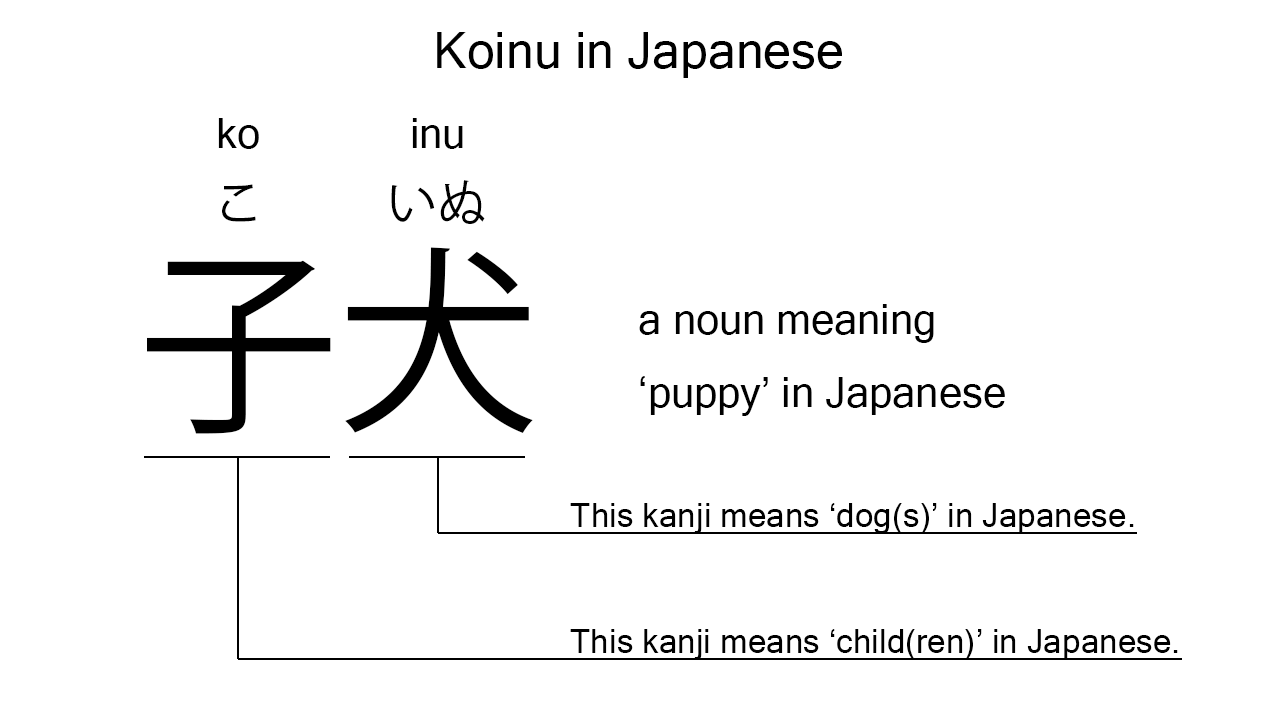What does “koinu” mean in Japanese?
Native speakers say “koinu” to mean ‘puppy’ in Japanese. Perhaps, some Japanese learners know this word as it is sometimes used in Japanese movies, novels, manga, anime, and the like. In this blog post, however, I will explain this word in detail based on its kanji expression. And also, I will explain how to use it through example sentences. My explanations would help Japanese learners understand “koinu” more clearly. Then, let’s get started!
Contents
Definition and meaning of “koinu”
Let me start with the definition and meaning of “koinu”.
- koinu – 子犬 (こいぬ) : a noun meaning ‘puppy’ in Japanese. This can also work as plural. Learn more about Japanese plural.
Native speakers use this noun to refer to a young dog or dogs in Japanese.
The definition and meaning are simple and clear, I think. To understand this noun more clearly, however, let me explain its kanji characters in detail, one by one.
Koinu in kanji
The kanji expression of “koinu” consists of the following two kanji characters:
- 子 : a kanji character used to mean ‘child’ or ‘kid’ in Japanese.
- 犬 : a kanji character used to mean ‘dog’ in Japanese.
These two kanji characters tell us that “koinu” literally means a ‘child dog’ in Japanese. This literal interpretation is very close to the actual meaning.

When we meet new kanji expressions, we should check their kanji characters in detail to understand their meanings clearly and deeply. In many cases, kanji characters tell us a lot about the meanings of the expressions they form. Actually, here, we could get the better understanding of “koinu” through the detailed kanji check above.
So far, I’ve explained the definition and meaning of “koinu” together with its kanji characters. Then, let me explain how to use it through the example sentences below.
Example #1: how to say “puppy” in Japanese
watashi wa koinu wo kai tai – 私は子犬を飼いたい (わたしはこいぬをかいたい)
I want a puppy.
Below are the new words used in the example sentence.
- watashi – 私 (わたし) : a pronoun meaning ‘I’ in Japanese.
- wa – は : a binding particle working as a case marker or topic marker. In the example, this works after “watashi” to make the subject in the sentence.
- wo – を : a case particle used to make the object word in a sentence. In the example, this is used after “koinu” to make the object in the sentence.
- kai – 飼い (かい) : one conjugation of the verb, “kau”, which means ‘to have (a pet)’ in Japanese. In the example, it has been conjugated for the better connection with its following word.
- tai – たい : an auxiliary verb used after a verb to make its desire form. In the example, this is used after “kai” to make its desire form, “kai tai”, which literally means ‘to want to have (a pet)’ in Japanese.
This is a typical usage of “koinu”. In the example, it works together with the case particle, “wo”, to become the object in the sentence.
Example #2: another usage of “koinu”
koinu wa min’na chiisaku te kawaii desu – 子犬はみんな小さくて可愛いです (こいぬはみんなちいさくてかわいいです)
All puppies are small and cute.
Below are the new words used in the example sentence.
- min’na – みんな : a pronoun meaning ‘all’, ‘everyone’, or such in Japanese. In the example, this works to say “all puppies” in Japanese.
- chiisaku – 小さく (ちいさく) : one conjugation of the i-adjective, “chiisai“, which means ‘small’ in Japanese. In the example, it has been conjugated for the better connection with its following word.
- te – て : a conjunctive particle used after a verb, adjective, or auxiliary verb to make its te form. In the example, this is used after “chiisaku” to make its te form, “chiisaku te”.
- kawaii – 可愛い (かわいい) : an i-adjective meaning ‘cute’ in Japanese.
This is another typical usage of “koinu”. When we want to refer to a young dog or dogs in Japanese, this noun is always a very good option.
Summary
In this blog post, I’ve explained the definition and meaning of “koinu” in detail based on its kanji expression. And also, I’ve explained how to use it through the example sentences. Let me summarize them as follows.
- koinu – 子犬 (こいぬ) : a noun meaning ‘puppy’ in Japanese. This can also work as plural. These two kanji characters literally mean a ‘child dog’ in Japanese. This literal interpretation is very close to the actual meaning. When we want to refer to a young dog or dogs in Japanese, this noun is always a very good option.
Hope my explanations are understandable and helpful for Japanese learners.
Leave a Reply